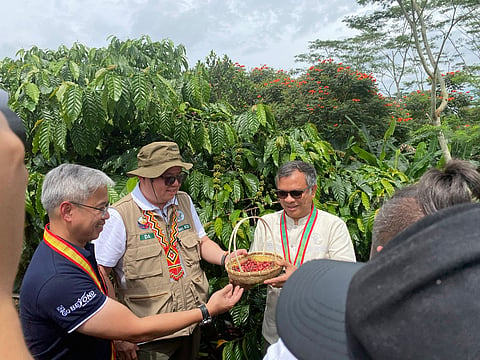
- NEWS
- the EDIT
- COMMENTARY
- BUSINESS
- LIFE
- SHOW
- ACTION
- GLOBAL GOALS
- SNAPS
- DYARYO TIRADA
- MORE

MALAYBALAY, Bukidnon — The Department of Agriculture (DA) on Tuesday vowed to aid more coffee farmers in Bukidnon and throughout the country to gain more yields and lessen the leaning to imported coffee beans in Vietnam and other coffee-producing countries.
“Our importation of coffee is 90 percent. So, we will reduce it by 15 percent by the end of 2026 and another 15 percent by 2027, something that is doable,” said Agriculture Secretary Francis Tiu-Laurel.
Tiu-Laurel was in Malaybalay, Bukidnon on Tuesday to give 150 bags of fertilizers to 16 farmer associations of coffee growers amounting to P4.4 million.
“We have already talked to the local government units of Sultan Kudarat and Bukidnon, and they are willing to give 20,000 hectares each to plant coffee beans. We only have to produce the planting materials,” he said.
With the current prices of coffee, Tiu-Laurel said farmers can earn P200,000 per hectare net for mono crops alone.
“The DA should invest in projects where farmers can earn,” he said.
The provision of fertilizers was part of the Mindanao Robusta Coffee Project which is joint initiative of the DA and Nestlé Philippines in keeping with the MRCP’s pledge of support to coffee farmers in this region.
In his speech, the DA secretary said he fully supports the continued adoption and improvement of sustainable farming practices, facilitation of knowledge-sharing, and promotion of climate-resilient coffee production through innovative and nature-based solutions.
“Among these is regenerative agriculture, which you also espouse and practice through your programs with the farming communities, including the Mindanao robusta coffee project. Embracing collaboration for collective action to enhance farmers’ resiliency and profitability is a must,” Tiu-Laurel said.
“We have to rely on partnerships among multiple stakeholders to establish resilient and sustainable coffee value chains and support growers as they shape their future under this new milieu,” he added.
He said the DA has seen encouraging and positive traces of public and private collaboration among key players.
“The initial 1,500 coffee communities in Bukidnon and Sultan Kudarat, now increased to 3,000, benefit from the collaboration between the farmers’ communities, Nestle, the German Federal Ministry, the local government agricultural establishment, the High-Value Crops Development Program of the Department of Agriculture, and other agencies. This has resulted in better bean quality and an increased average yield of up to .8 metric tons per hectare from a low of .3 metric tons. In this connection, the income of farmers has risen by 35 percent or more in some areas,” Tiu-Laurel further explained.
